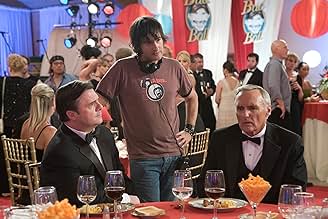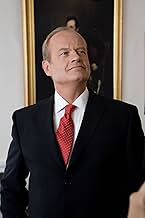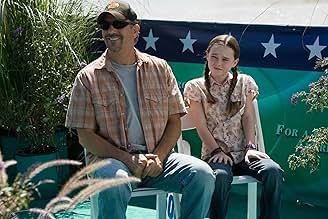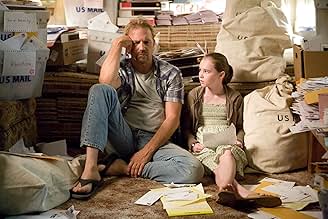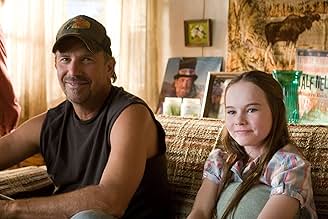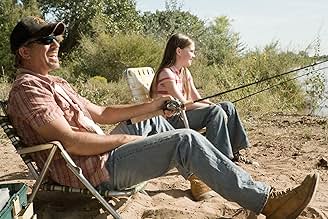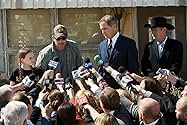NOTE IMDb
6,1/10
20 k
MA NOTE
Ajouter une intrigue dans votre langueIn a remarkable turn-of-events, the result of the presidential election comes down to one man's vote.In a remarkable turn-of-events, the result of the presidential election comes down to one man's vote.In a remarkable turn-of-events, the result of the presidential election comes down to one man's vote.
- Réalisation
- Scénario
- Casting principal
- Récompenses
- 1 nomination au total
Charles Esten
- Lewis
- (as Charles 'Chip' Esten)
Avis à la une
If the 2000 Presidential election could be decided by a single county in Florida (with a little help from the United States Supreme Court, of course), imagine what it would be like if the decision ever came down to a single individual voter! That's the scenario put forth by "Swing Vote," a political fantasy that will probably be remembered more for launching the career of a talented young actress than for any insight it might offer into the political process.
Bud Johnson is a working-class divorced dad who lives in a broken-down trailer with his bright, twelve-year-old daughter, Molly - a youngster who is as astute and savvy about real world issues and politics as her father is ignorant and apathetic. Through a complicated fluke of fate, Bud finds himself in the unenviable position of being the sole swing vote in an otherwise deadlocked presidential contest. Suddenly, Bud is living in the glare of the media spotlight, besieged by candidates, campaign managers, handlers, celebrities and various special interest groups all vying for his vote.
Political satire rarely works on screen for the simple reason that it is either so slanted (usually towards the liberal side) that it winds up preaching mainly to the converted, or it's kept so inoffensive and generic that it loses any edge it might have had and becomes an exercise in watered-down, self-congratulatory Capraesque populism. "Swing Vote," oddly enough, falls into both categories at once - with conservatives likely to view it as little more than a two-hour commercial for the Democratic Party (or at least the issues they stand for) and move on. In strictly cinematic terms, "Swing Vote," co-written by Jason Richman and Joshua Michael Stern and directed by Stern, is really two movies folded into one. The first is a sometimes touching story of a father/daughter relationship in which the child is parent to the father. Kevin Costner (who pretty much financed the project himself) pours on the charm as a boozy, irresponsible slacker who's more interested in popping open a beer can and plopping down in front of the TV set than in actively rearing his daughter. Relative newcomer Madeline Carroll is a real find as the no-nonsense, wise-beyond-her-years Molly who takes care of her dad and isn't afraid to speak truth to power when the situation calls for it. Whenever the film is concentrating on the interplay between these two characters, it hits a responsive chord in the viewer. In fact, the scene in which Molly confronts the alcoholic mother who abandoned her (wonderfully played by Mare Winningham) makes for some genuinely powerful and gripping human drama.
Unfortunately, the second and much larger portion of the film (that is to say, the political part) doesn't fare nearly so well. Its revelation that politics is a dirty business - i.e. that it often prizes empty platitudes and sound bites over exploring issues of substance, and that it appeals to voters' greed, fears, ignorance and prejudices to win votes - is hardly an earth-shattering one at this late stage of the game, true though it may be. The film has lots of big-name stars - Kelsey Grammar, Dennis Harper, Nathan Lane, Stanley Tucci, George Lopez, Judge Reinhold - and a number of actual TV pundits and commentators throwing themselves into their roles with admirable aplomb, but the material isn't clever or sharp enough to really deliver the goods. Everyone, except for the two main characters, is quickly reduced to a "type" and the attempts at political parody are fairly obvious and lightweight compared to what we find in venues like "The Daily Show" or "The Colbert Report."
"Swing Vote"'s clarion call for all individuals to take their responsibility as citizens seriously and to become actively involved in the political process can't help but be uplifting and inspiring, especially in a presidential election year. The filmmakers just needed a bolder, more sophisticated vehicle from which to sound that call.
My advice is to look past all the political nonsense and concentrate on the beautiful performance by the young Ms. Carroll instead - and be present at the birth of a brand new star.
Bud Johnson is a working-class divorced dad who lives in a broken-down trailer with his bright, twelve-year-old daughter, Molly - a youngster who is as astute and savvy about real world issues and politics as her father is ignorant and apathetic. Through a complicated fluke of fate, Bud finds himself in the unenviable position of being the sole swing vote in an otherwise deadlocked presidential contest. Suddenly, Bud is living in the glare of the media spotlight, besieged by candidates, campaign managers, handlers, celebrities and various special interest groups all vying for his vote.
Political satire rarely works on screen for the simple reason that it is either so slanted (usually towards the liberal side) that it winds up preaching mainly to the converted, or it's kept so inoffensive and generic that it loses any edge it might have had and becomes an exercise in watered-down, self-congratulatory Capraesque populism. "Swing Vote," oddly enough, falls into both categories at once - with conservatives likely to view it as little more than a two-hour commercial for the Democratic Party (or at least the issues they stand for) and move on. In strictly cinematic terms, "Swing Vote," co-written by Jason Richman and Joshua Michael Stern and directed by Stern, is really two movies folded into one. The first is a sometimes touching story of a father/daughter relationship in which the child is parent to the father. Kevin Costner (who pretty much financed the project himself) pours on the charm as a boozy, irresponsible slacker who's more interested in popping open a beer can and plopping down in front of the TV set than in actively rearing his daughter. Relative newcomer Madeline Carroll is a real find as the no-nonsense, wise-beyond-her-years Molly who takes care of her dad and isn't afraid to speak truth to power when the situation calls for it. Whenever the film is concentrating on the interplay between these two characters, it hits a responsive chord in the viewer. In fact, the scene in which Molly confronts the alcoholic mother who abandoned her (wonderfully played by Mare Winningham) makes for some genuinely powerful and gripping human drama.
Unfortunately, the second and much larger portion of the film (that is to say, the political part) doesn't fare nearly so well. Its revelation that politics is a dirty business - i.e. that it often prizes empty platitudes and sound bites over exploring issues of substance, and that it appeals to voters' greed, fears, ignorance and prejudices to win votes - is hardly an earth-shattering one at this late stage of the game, true though it may be. The film has lots of big-name stars - Kelsey Grammar, Dennis Harper, Nathan Lane, Stanley Tucci, George Lopez, Judge Reinhold - and a number of actual TV pundits and commentators throwing themselves into their roles with admirable aplomb, but the material isn't clever or sharp enough to really deliver the goods. Everyone, except for the two main characters, is quickly reduced to a "type" and the attempts at political parody are fairly obvious and lightweight compared to what we find in venues like "The Daily Show" or "The Colbert Report."
"Swing Vote"'s clarion call for all individuals to take their responsibility as citizens seriously and to become actively involved in the political process can't help but be uplifting and inspiring, especially in a presidential election year. The filmmakers just needed a bolder, more sophisticated vehicle from which to sound that call.
My advice is to look past all the political nonsense and concentrate on the beautiful performance by the young Ms. Carroll instead - and be present at the birth of a brand new star.
Kevin Costner was actually in another decent movie. His last movie I saw, Mr. Brooks, was pretty good also. I would call this movie a political satire, that tries to be a little funny at times. However, the idea that one guy determines the presidential election is absurd, but if you can get past that, then the plot is OK. It was funny how the movie had the political parties doing adds for things they oppose. Example, the democrats supporting pro life because Bud says he's pro life.
The plot is struggling, every day man, Bud Johnson, just got laid off. He has a very smart daughter and she cares about the presidential election. Bud promises to vote since Molly thinks it's important. But, when he doesn't show, Molly votes in his place but the power goes out and the vote didn't count. The election comes down to New Mexico and for some reason, not told in the movie, Bud's vote will decide the electoral votes. I mean, how could the votes be even for each side and even if they were very close, how many months would it take for all the recounts that would take place. But any way, it's up to Bud, whom doesn't care about politics. He becomes an instant celebrity and is courted by both candidates. By the end of the film, Bud grows an appreciation for the political scene and realizes that it is important to care about social issues.
FINAL VERDICT: Funnier than I thought and provides a message. Plus, the movie doesn't try to say that one party is better than the other.
The plot is struggling, every day man, Bud Johnson, just got laid off. He has a very smart daughter and she cares about the presidential election. Bud promises to vote since Molly thinks it's important. But, when he doesn't show, Molly votes in his place but the power goes out and the vote didn't count. The election comes down to New Mexico and for some reason, not told in the movie, Bud's vote will decide the electoral votes. I mean, how could the votes be even for each side and even if they were very close, how many months would it take for all the recounts that would take place. But any way, it's up to Bud, whom doesn't care about politics. He becomes an instant celebrity and is courted by both candidates. By the end of the film, Bud grows an appreciation for the political scene and realizes that it is important to care about social issues.
FINAL VERDICT: Funnier than I thought and provides a message. Plus, the movie doesn't try to say that one party is better than the other.
8somf
Yes, the whole concept is absurd, and as a result the film will probably take a lot of criticism, but I really enjoyed every minute of it at an early screening this evening. I enjoy Kevin Costner's work except when he tries to go action hero and he is thankfully getting too old for that unless he decides to buy growth hormone from Stallone or something. He was terrific in Mr. Brooks and he excels once again in a totally different role. It is the sort of character that he does best, more akin to his "Bull Durham" role.
The real find of the film was Madeline Carrol who played his daughter. She joins Abagail Breslin, Dakota Fanning , and Anna Sophia Robb in a current crop of extremely talented tweeners.
I enjoyed the entire cast and it was great to see Judge Reinhold for the first time in awhile.
The whole concept of how Costner's vote becomes so important is one that is hard to swallow, but if you go along for the ride I promise that you will have a great time.
Late in the film Mare Winningham appears in perhaps the films most powerful though least appropriate scene. It is her only scene. I believe it was used to hammer in a serious message though the scene had little to do with the message of the film other than shift to a more sober mood. Sober may not have been the best choice of words to describe the scene though.
One of the nicer aspects of the film is its terrific music. A mix of tunes from several decades centered around Marshall Tucker's "Can't You See" really makes for a nice soundtrack.
Ultimately the film has a great message about the importance of one person, one vote. And if it gets a lot more democrats(whoops I mean Americans) to vote this year, then in my opinion it will have done a great public service in addition to being solidly entertaining. And no, it does not have a liberal agenda, so all you Rush fans need to hold judgment before slamming the film. Unlike this reviewer, the film is really good at not taking a political stance. The film depicts all politicians as if they would stoop to anything to get elected, and garners a lot of laughs with that premise.
I want to add one last thing. I would call this a family movie except for the profanity. I took my 9 year old precocious daughter and she loved it, but there was actually a running joke about Costner's character's love of swearing. So if a little swearing and some references to controversial issues (abortion, gay marriage, legal pot) are OK with you, bring the kids. Like I said, it does have a good message.
The real find of the film was Madeline Carrol who played his daughter. She joins Abagail Breslin, Dakota Fanning , and Anna Sophia Robb in a current crop of extremely talented tweeners.
I enjoyed the entire cast and it was great to see Judge Reinhold for the first time in awhile.
The whole concept of how Costner's vote becomes so important is one that is hard to swallow, but if you go along for the ride I promise that you will have a great time.
Late in the film Mare Winningham appears in perhaps the films most powerful though least appropriate scene. It is her only scene. I believe it was used to hammer in a serious message though the scene had little to do with the message of the film other than shift to a more sober mood. Sober may not have been the best choice of words to describe the scene though.
One of the nicer aspects of the film is its terrific music. A mix of tunes from several decades centered around Marshall Tucker's "Can't You See" really makes for a nice soundtrack.
Ultimately the film has a great message about the importance of one person, one vote. And if it gets a lot more democrats(whoops I mean Americans) to vote this year, then in my opinion it will have done a great public service in addition to being solidly entertaining. And no, it does not have a liberal agenda, so all you Rush fans need to hold judgment before slamming the film. Unlike this reviewer, the film is really good at not taking a political stance. The film depicts all politicians as if they would stoop to anything to get elected, and garners a lot of laughs with that premise.
I want to add one last thing. I would call this a family movie except for the profanity. I took my 9 year old precocious daughter and she loved it, but there was actually a running joke about Costner's character's love of swearing. So if a little swearing and some references to controversial issues (abortion, gay marriage, legal pot) are OK with you, bring the kids. Like I said, it does have a good message.
It sounds implausible and impossiblethat a man's accidental flub-up in the voting booth causes his vote to stall the election and coincidentally determine the next U.S. President. But Swing Vote has a great time using that as a platform to tell a really cool tale.
Besides, the movie wants to move past that impossibility anyway (suspension of disbelief, right?), and into the fun stuff. Swing Vote isn't necessarily about the likelihood of the above-mentioned phenomenon occurring; it's about bigger things, things like the nature of freedom in America, the right to vote, politicians and their campaigns, and various issues that unite and divide America as a nation.
Ernest "Bud" Johnson (Kevin Costner) is a beer-drinking, blue-collar simpleton whose wife left both him and his daughter, Molly, for a Nashville singing career. Molly (Madeline Carroll), a precocious little girl who is passionate about politics and the preservation of her country, and unfortunately for her, Bud couldn't care less, even if her were sober. Molly seems to be the parent in the relationship, taking care of Bud's daily hangovers and prodding him to get up for work.
Molly is in constant frustration with her father's apathy toward life and her interests, and is perturbed when Bud seemingly sets in motion an ironic, history-making turn of events where his vote actually ends up being the deciding factor in the election. This forces the Presidential candidates to campaign only to win Bud's vote. Along the way we are treated to a satirical look at the lengths campaign managers and the candidates will go simply to get a vote.
How this plays out is both hilarious and sobering, as well as inspiring and totally enjoyablethanks to some good storytelling and direction, as well as an excellent cast of talented actors who make this movie shine. The brightest stars on the screen, however, are Kevin Costner and Madeline Carroll as Bud and Molly. Costner has found a perfect role in the dimwitted Bud, and Carroll as Molly is a brilliant young actor whose performance almost brought me to tears at one point.
Like I mentioned before, though, Swing Vote is not a simple "voting is your civic duty" story. While the importance of voting is emphasized as both a privilege and a blessing in a great country, Swing Vote goes over the issues that affect daily life in America, and through the story reminds us how we can take some sort of action to better that life.
However, Swing Vote is careful not to play too much on the emotional arguments regarding various issues like abortion, immigration and gay marriage, making the movie all the more charming. There are a few emotionally charged scenes in the movie that give weight to the hilarity throughout, but within the context of the film, the story never speaks in self-righteousness.
At one point, Molly makes a simple yet convicting commentary about how much she appreciates her father at a "Bring Your Father to School" Day. Without giving too much away, Molly's emotional message about her father is a hopeful and heart-wrenching commentary about the beauty and freedom of America, along with the tragic complacency and apathy of its people.
And rather than going down the typical Hollywood route and picking a more liberal stance, Swing Vote instead manages to poke fun at everyone on both "sides" of various issues. It carefully gives respect to all Americans, while pointing out absurdities in America's political process. Although the mockery is at times absolutely hilarious, the film's humor never ventures into the vile and mean-spirited. There is purpose behind all the fun, and it is carefully crafted into the story, with the goal of giving a message of hope and focusing on the (hopefully) common goal of compassion, care, peace, and freedom to all people (to all Americans, anyway).
In that sense, Swing Vote could almost be seen as patriotic (even the movie's production design seems to have red, white, and blue hues throughout). There are many inspiring moments that make you think, "Wow, America is a great country," and "Shame on me for taking my freedom for granted." Okay, well, that's a little simplistic; but you'll understand what I mean: Swing Vote is an American story with a clear and powerful message.
It may be convicting in its truthful satire and simple wit, but it is also encouraging in that it promotes the hope that we can make a better country by actively changing (ourselves and our country) and refusing to passively observe our nation's future unfold... not only for us, but for generations to come.
Besides, the movie wants to move past that impossibility anyway (suspension of disbelief, right?), and into the fun stuff. Swing Vote isn't necessarily about the likelihood of the above-mentioned phenomenon occurring; it's about bigger things, things like the nature of freedom in America, the right to vote, politicians and their campaigns, and various issues that unite and divide America as a nation.
Ernest "Bud" Johnson (Kevin Costner) is a beer-drinking, blue-collar simpleton whose wife left both him and his daughter, Molly, for a Nashville singing career. Molly (Madeline Carroll), a precocious little girl who is passionate about politics and the preservation of her country, and unfortunately for her, Bud couldn't care less, even if her were sober. Molly seems to be the parent in the relationship, taking care of Bud's daily hangovers and prodding him to get up for work.
Molly is in constant frustration with her father's apathy toward life and her interests, and is perturbed when Bud seemingly sets in motion an ironic, history-making turn of events where his vote actually ends up being the deciding factor in the election. This forces the Presidential candidates to campaign only to win Bud's vote. Along the way we are treated to a satirical look at the lengths campaign managers and the candidates will go simply to get a vote.
How this plays out is both hilarious and sobering, as well as inspiring and totally enjoyablethanks to some good storytelling and direction, as well as an excellent cast of talented actors who make this movie shine. The brightest stars on the screen, however, are Kevin Costner and Madeline Carroll as Bud and Molly. Costner has found a perfect role in the dimwitted Bud, and Carroll as Molly is a brilliant young actor whose performance almost brought me to tears at one point.
Like I mentioned before, though, Swing Vote is not a simple "voting is your civic duty" story. While the importance of voting is emphasized as both a privilege and a blessing in a great country, Swing Vote goes over the issues that affect daily life in America, and through the story reminds us how we can take some sort of action to better that life.
However, Swing Vote is careful not to play too much on the emotional arguments regarding various issues like abortion, immigration and gay marriage, making the movie all the more charming. There are a few emotionally charged scenes in the movie that give weight to the hilarity throughout, but within the context of the film, the story never speaks in self-righteousness.
At one point, Molly makes a simple yet convicting commentary about how much she appreciates her father at a "Bring Your Father to School" Day. Without giving too much away, Molly's emotional message about her father is a hopeful and heart-wrenching commentary about the beauty and freedom of America, along with the tragic complacency and apathy of its people.
And rather than going down the typical Hollywood route and picking a more liberal stance, Swing Vote instead manages to poke fun at everyone on both "sides" of various issues. It carefully gives respect to all Americans, while pointing out absurdities in America's political process. Although the mockery is at times absolutely hilarious, the film's humor never ventures into the vile and mean-spirited. There is purpose behind all the fun, and it is carefully crafted into the story, with the goal of giving a message of hope and focusing on the (hopefully) common goal of compassion, care, peace, and freedom to all people (to all Americans, anyway).
In that sense, Swing Vote could almost be seen as patriotic (even the movie's production design seems to have red, white, and blue hues throughout). There are many inspiring moments that make you think, "Wow, America is a great country," and "Shame on me for taking my freedom for granted." Okay, well, that's a little simplistic; but you'll understand what I mean: Swing Vote is an American story with a clear and powerful message.
It may be convicting in its truthful satire and simple wit, but it is also encouraging in that it promotes the hope that we can make a better country by actively changing (ourselves and our country) and refusing to passively observe our nation's future unfold... not only for us, but for generations to come.
I'm going to go ahead and assume that it's not an easy task to make a crowd-pleasing movie centered on politics that goes to such strenuous efforts to be non-partisan and maybe chalk up my dissatisfaction with the movie to that. Then again, it might also have something to do with a critical decision that they made in how to end the movie, which is sure to make every single solitary person who watches it throw up their arms in disgust.
But the movie is not about who wins the presidency, it's about the pure chaos of the American political system and its millions of weaknesses and faults. Sure, the premise of a presidential election coming down to a single vote is as preposterous as they come, but man if this movie doesn't get you thinking critically about the electoral process then it's safe to assume that probably nothing ever will.
Kevin Costner plays Bud, an American nobody from New Mexico who has never done anything with his life except have a daughter with a delusional drug addict who thinks she has a big singing career in her near future. He works as an egg inspector at an egg packaging plant, and he and his co-workers mourn the loss of their friends' (and soon, their own) jobs to "insourcing," the process of bringing Mexicans in to take their jobs rather than ship the factory and all those egg-laying chickens to Mexico.
Bud staggers through life in a drunken daze most of the time, routinely letting down his daughter Molly (Madeline Carroll), who raises him like a child. She gets him out of bed in the morning, criticizes his laziness and irresponsibility, reminds him to vote because it's part of a school project that she has to do, and through sighs of exasperation attempts to keep him at least a little bit in line. And of course it's the only thing in life that she fails at. When Bud gets drunk rather than show up to vote, she manages to almost cast his vote herself due to the sleepy voting booth security of beautiful Texico, New Mexico, which Google Earth has just informed me is a real place. Population 1,065.
In a clever plot development, it turns out that Bud's vote didn't go completely through but it appeared that he was there, so he is given another opportunity to cast his vote. Not right away, mind you, even though he evidently already tried to vote and thus probably had his mind made up. No, he is given ten days before he has to vote, thus providing plenty of time for a movie to happen.
Young Madeline Carroll steals most of the scenes that she's in as Bud's daughter, so it's interesting that her character is one of the biggest weak points in the movie, the other one being her dad. Bud is supposed to be a typical American, but I just saw a drifting drunk who never did anything with his life and never would have had he not been forced to. It's true that the vast majority of Americans live lives that are closer to Bud's than President Boone's (Kelsey Grammar), but does he have to be a TOTAL loser? How about just making him be a likable, regular guy? Like the guy he played in Field of Dreams? When I imagine the average American, I imagine something like Ray Kinsella. Although maybe with a slightly smaller house and less whispering from the sky.
The other problem is that the screenwriters overshot the character of Molly by about 160 IQ points. So much for the average American, right? This girl writes a school essay that doesn't merit a special award from the principal to show her dad, it grants her NATIONAL TELEVISED RECOGNITION. But to be honest, I had more of a problem with the fact that not only does she wake her deadbeat dad up in the morning so he could take her to school, she also treks to the bar and, finding him passed out in his truck when he should have been voting, she pushes him over and then drives him home herself. She's about 11 years old.
But where the movie succeeds is as a scathing revelation about certain realities of the American electoral process, such as the electoral college, which simplifies the vote-counting process even while massively distorting the actual numbers of who voted for who. The whole movie is about how one man's vote really does matter, but it leaves you with the feeling that you are supposed to forget that once he votes, every single vote in his state for the other candidate WON'T matter anymore, because they'll be switched to the other candidate. Isn't it interesting how that works? Can't we just count every single vote and award each candidate one huge number of individual votes? Seems a little more accurate to me.
Anyway, I do appreciate the way the movie highlights the fact that both sides, Republican and Democrat, are equally willing to stoop to any level and do absolutely whatever it takes to win, and that no one is above hitting below the belt and making hugely unethical decisions. There is a lot that needs to be changed in American politics, and even while clearly being based on the Election of 2000, one of the most controversial in American history, it calls those things to attention without ever even hinting that either side is right or wrong. The movie insists that America is the greatest country in the world but that in some ways, we're doing it all wrong, but the fact that a movie like this has the freedom to get made proves that even though we haven't reached a level of pure cohesive harmony, underneath all of our imperfections is a clear desire to get there.
But the movie is not about who wins the presidency, it's about the pure chaos of the American political system and its millions of weaknesses and faults. Sure, the premise of a presidential election coming down to a single vote is as preposterous as they come, but man if this movie doesn't get you thinking critically about the electoral process then it's safe to assume that probably nothing ever will.
Kevin Costner plays Bud, an American nobody from New Mexico who has never done anything with his life except have a daughter with a delusional drug addict who thinks she has a big singing career in her near future. He works as an egg inspector at an egg packaging plant, and he and his co-workers mourn the loss of their friends' (and soon, their own) jobs to "insourcing," the process of bringing Mexicans in to take their jobs rather than ship the factory and all those egg-laying chickens to Mexico.
Bud staggers through life in a drunken daze most of the time, routinely letting down his daughter Molly (Madeline Carroll), who raises him like a child. She gets him out of bed in the morning, criticizes his laziness and irresponsibility, reminds him to vote because it's part of a school project that she has to do, and through sighs of exasperation attempts to keep him at least a little bit in line. And of course it's the only thing in life that she fails at. When Bud gets drunk rather than show up to vote, she manages to almost cast his vote herself due to the sleepy voting booth security of beautiful Texico, New Mexico, which Google Earth has just informed me is a real place. Population 1,065.
In a clever plot development, it turns out that Bud's vote didn't go completely through but it appeared that he was there, so he is given another opportunity to cast his vote. Not right away, mind you, even though he evidently already tried to vote and thus probably had his mind made up. No, he is given ten days before he has to vote, thus providing plenty of time for a movie to happen.
Young Madeline Carroll steals most of the scenes that she's in as Bud's daughter, so it's interesting that her character is one of the biggest weak points in the movie, the other one being her dad. Bud is supposed to be a typical American, but I just saw a drifting drunk who never did anything with his life and never would have had he not been forced to. It's true that the vast majority of Americans live lives that are closer to Bud's than President Boone's (Kelsey Grammar), but does he have to be a TOTAL loser? How about just making him be a likable, regular guy? Like the guy he played in Field of Dreams? When I imagine the average American, I imagine something like Ray Kinsella. Although maybe with a slightly smaller house and less whispering from the sky.
The other problem is that the screenwriters overshot the character of Molly by about 160 IQ points. So much for the average American, right? This girl writes a school essay that doesn't merit a special award from the principal to show her dad, it grants her NATIONAL TELEVISED RECOGNITION. But to be honest, I had more of a problem with the fact that not only does she wake her deadbeat dad up in the morning so he could take her to school, she also treks to the bar and, finding him passed out in his truck when he should have been voting, she pushes him over and then drives him home herself. She's about 11 years old.
But where the movie succeeds is as a scathing revelation about certain realities of the American electoral process, such as the electoral college, which simplifies the vote-counting process even while massively distorting the actual numbers of who voted for who. The whole movie is about how one man's vote really does matter, but it leaves you with the feeling that you are supposed to forget that once he votes, every single vote in his state for the other candidate WON'T matter anymore, because they'll be switched to the other candidate. Isn't it interesting how that works? Can't we just count every single vote and award each candidate one huge number of individual votes? Seems a little more accurate to me.
Anyway, I do appreciate the way the movie highlights the fact that both sides, Republican and Democrat, are equally willing to stoop to any level and do absolutely whatever it takes to win, and that no one is above hitting below the belt and making hugely unethical decisions. There is a lot that needs to be changed in American politics, and even while clearly being based on the Election of 2000, one of the most controversial in American history, it calls those things to attention without ever even hinting that either side is right or wrong. The movie insists that America is the greatest country in the world but that in some ways, we're doing it all wrong, but the fact that a movie like this has the freedom to get made proves that even though we haven't reached a level of pure cohesive harmony, underneath all of our imperfections is a clear desire to get there.
Le saviez-vous
- AnecdotesStanley Tucci's line "If you'd ever met my mother, you'd understand," was an ad-lib.
- GaffesAir Force One is never allowed to sit idle on a runway with the President on board.
- Citations
Molly Johnson: I want to live with Mom.
Bud Johnson: So do I.
- Crédits fous"and introducing Madeline Carroll"
- Bandes originalesCan't You See
Written by Toy Caldwell Jr. (as Toy Caldwell)
Performed by The Marshall Tucker Band
Courtesy of Shout Factory, LLC
By Arrangement with Natural Energy Lab
Meilleurs choix
Connectez-vous pour évaluer et suivre la liste de favoris afin de recevoir des recommandations personnalisées
Détails
Box-office
- Budget
- 21 000 000 $US (estimé)
- Montant brut aux États-Unis et au Canada
- 16 289 867 $US
- Week-end de sortie aux États-Unis et au Canada
- 6 230 669 $US
- 3 août 2008
- Montant brut mondial
- 17 635 397 $US
- Durée
- 2h(120 min)
- Couleur
- Mixage
- Rapport de forme
- 2.35 : 1
Contribuer à cette page
Suggérer une modification ou ajouter du contenu manquant







